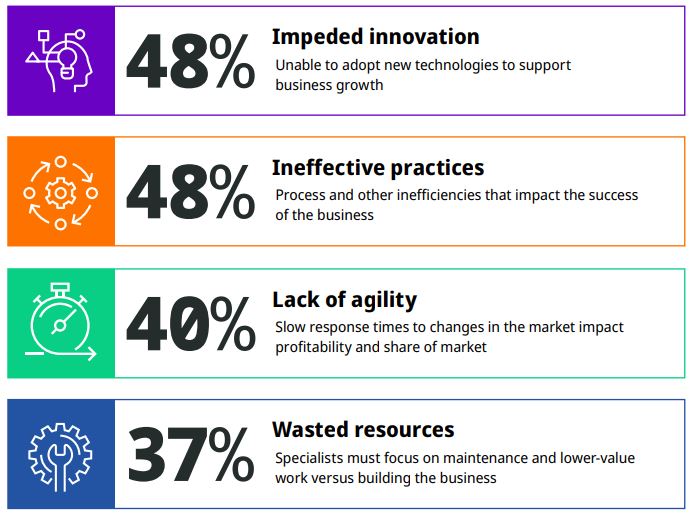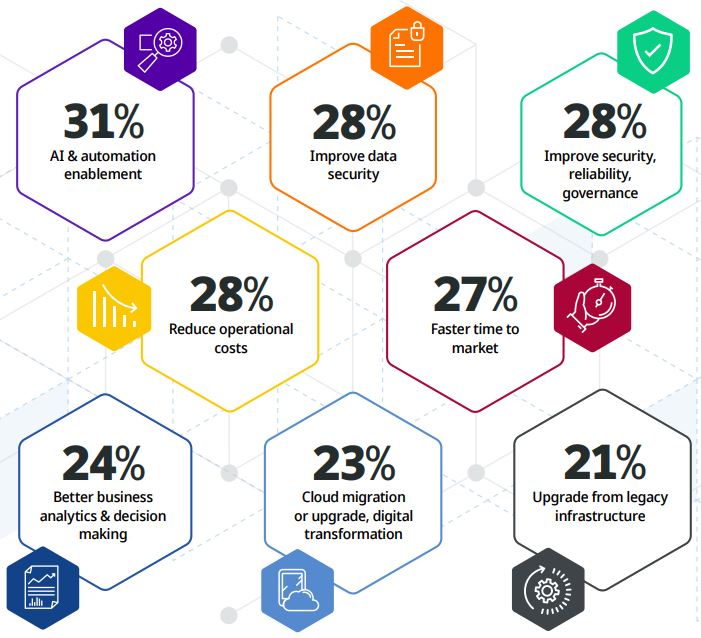98% of Enterprises Struggle To Maintain, Rebuild Integrations for Key Business Apps
An astounding 98% of IT execs say they had to rebuild at least one integration in the past year, according to a report from eiPaaS provider Digibee. IDN talks with CEO Rodrigo Bernardinelli.
by Vance McCarthy
Tags: AI, automation, cloud, Digibee, eiPaaS, integration, legacy modernization,

CEO

"While IT teams have been able to build integrations to support the business, there are many inefficiencies that have negative impacts."
 Integration Powers Digital Transformation for APIs, Apps, Data & Cloud in the Enterprise
Integration Powers Digital Transformation for APIs, Apps, Data & Cloud in the EnterpriseDecember 8, 2022
Over the past year, many enterprises struggled to maintain or rebuild integrations for their critical business apps, according to The Digibee 2022 State of Enterprise Integration Report.
In fact, the Digibee report found:
- A whopping 98% of enterprise architects and integration professionals admit they were required to rebuild integrations for at least one of their crucial business applications in the past 12 months.
- Of those, some 45% of developers confessed they had to rebuild their key integrations multiple times – some as many as ten times.
Digibee is an eiPaaS, enterprise integration platform as a service company.
The Digibee findings underscore a common issue that has long faced architects and integration professionals – many integrations turn into one-off, as-needed tasks, lacking a big picture, strategic approach.
The Digibee report put it this way:
Grappling with monolithic technology stacks and legacy infrastructure that doesn’t give an inch, [many] companies are simply unable to keep up. Others are making the leap, leveraging enterprise integration to tap into powerful innovations such as artificial intelligence, machine learning, automation, cloud migration, omni-channel customer experiences, and so much more.
Moreover, the daily needs of the business can conflict with the longer-term need to adopt new technologies and architectures. Digibee CEO Rodrigo Bernardinelli described the state of enterprise integrations this way to IDN.
"IT leaders are constantly balancing the desire to be strategic while handling the tactical day-to-day demands of the business. Our findings support that integrations fall victim to the same balancing act, forcing teams to leverage an ad-hoc approach.
While IT teams have been able to build integrations between systems and applications to support the business, there are many inefficiencies and disjointed processes that have negative impacts.
Digibee’s report was able to quantify those negative impacts as follows:
Taking a more strategic, enterprise approach using a cloud-based integration platform would alleviate these negative impacts, according to Bernardinelli. Embracing an enterprise-wide approach to standardize integrations into a unified strategy increases IT effectiveness and productivity while reducing performance issues and security risk,” he told IDN.
Report Also Highlights Initiatives Causing Integration Struggles
Digibee’s report also identified that many digital transformation projects are the main culprits behind the need for ongoing updates of integrations.
These include many popular initiatives, including:
As Digibee CTO and Founder Peter Kreslins put it, “Business leaders are making big decisions—and big investments to solidify the future of their companies. Shifting operations to the cloud, de-siloing enterprise data, replacing what isn’t working with purpose-built point solutions. What we once considered IT nice-to-haves have become table stakes.”
The report stated it this way:
Organizations around the world are rapidly evolving to a digital-first technology model to support business-critical initiatives such as cloud migration and omnichannel customer experiences. However, the Digibee 2022 State of Enterprise Integration Report reveals that, while most business leaders understand the urgency in modernizing existing infrastructure, most respondents face significant challenges integrating their existing operations with this future state.
As continuous updates for integrations have become more common, most companies have come to believe developing an “enterprise integration strategy” would help efficiently address such issues. On this point, Digibee’s report found.
- Most business leaders (57%) believe an enterprise integration strategy is critical to their organization.
- Even better, 61% of CIOs (and more than half of system architects and developers) said a “standardized, enterprise integration strategy” is a top priority.
But despite growing support and enthusiasm for such an “enterprise integration strategy,” the report revealed little progress.
- Only 7% of respondents said they had succeeded in implementing an enterprise integration strategy.
- Some 6% say they have such an “enterprise integration strategy” underway, and will invest to update it within the next 12 months.
- More than half (51%) say they intend to activate an enterprise integration strategy within the next 12 months.
- But more than one-third, 36%, say no such strategy is even being planned.
Businesses Understand the Value of Modern Integration
Digibee CTO Kreslins summarized the outlook as part of his closing statement from the report.
He said that many business leaders now recognize how important integration is to many digital transformation projects. That said, he further noted that integration vendors should be focused on making modern integration easier to understand and easier to deliver.
The data from the Digibee survey reflects the significant change and conflict that is underway.
Technology leaders understand the value and urgency in integrating the enterprise, yet many are frustrated in their efforts to achieve this result. While over half of all respondents consider enterprise integration to be an imperative for their business, fewer than 10% know with certainty the technology model they will use.
Opening access to enterprise integration, providing it as a service to all organizations regardless of infrastructure, budget, and available resources, helps to even the playing field. Technical teams can integrate products quickly so business users can implement the systems the company needs to succeed. Speed to value becomes a reality.
The Digibee 2022 State of Enterprise Integration Report was completed in partnership with research firm CensusWide. The report surveyed more than 1,000 U.S.-based CIOs, developers and enterprise architects.
Related:
- Tray Advantage Program To Speed, Simplify AI-Powered Automation for Enterprises
- Removing Barriers to Business by Enabling Agility & Control with Ecosystem Integration
- ThreatX Adds API Visibility, Protection Capabilities To Defend Against Real-Time Attacks
- Visibility and Transparency are Climbing the List of C-Suite Priorities in 2022
- Cleo Adds To EDI Ecosystem with Low-Code, Pre-Built Logistics Integration Solution
All rights reserved © 2025 Enterprise Integration News, Inc.




